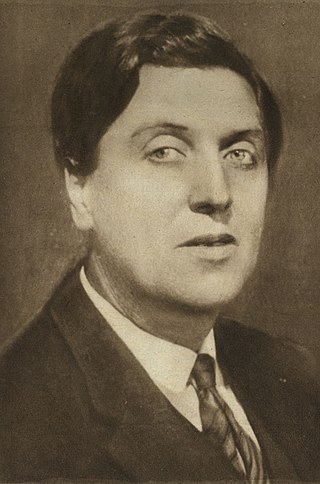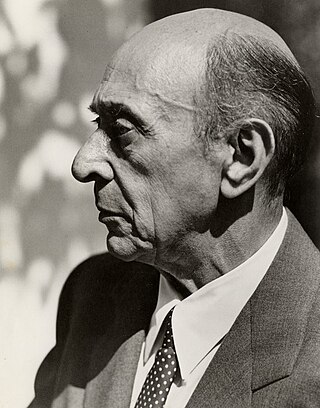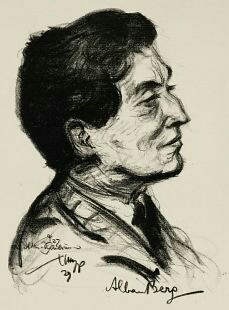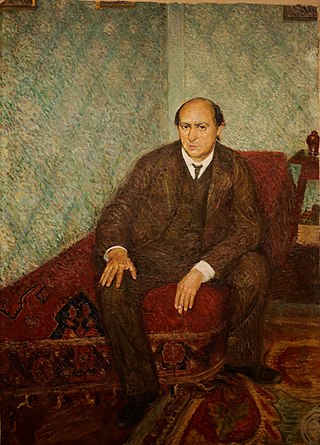
Alban Maria Johannes Berg was an Austrian composer of the Second Viennese School. His compositional style combined Romantic lyricism with the twelve-tone technique. Although he left a relatively small oeuvre, he is remembered as one of the most important composers of the 20th century for his expressive style encompassing "entire worlds of emotion and structure".

Anton Webern was an Austrian composer, conductor, and musicologist. His music was among the most radical of its milieu in its concision and use of then novel atonal and twelve-tone techniques in an increasingly rigorous manner, somewhat after the Franco-Flemish School of his studies under Guido Adler. With his mentor Arnold Schoenberg and his colleague Alban Berg, Webern was at the core of those within the broader circle of the Second Viennese School. Their atonal music brought them fame and stirred debate. Webern was arguably the first and certainly the last of the three to write music in an aphoristic, expressionist style, reflecting his instincts and the idiosyncrasy of his compositional process.

Arnold Schoenberg or Schönberg was an Austrian and American composer, music theorist, teacher and writer. He was among the first modernists who transformed the practice of harmony in 20th-century classical music, and a central element of his music was its use of motives as a means of coherence. He propounded concepts like developing variation, the emancipation of the dissonance, and the "unity of musical space".

The Second Viennese School was the group of composers that comprised Arnold Schoenberg and his pupils, particularly Alban Berg and Anton Webern, and close associates in early 20th-century Vienna. Their music was initially characterized by late-Romantic expanded tonality and later, a totally chromatic expressionism without a firm tonal centre, often referred to as atonality; and later still, Schoenberg's serial twelve-tone technique. Adorno said that the twelve-tone method, when it had evolved into maturity, was a "veritable message in a bottle", addressed to an unknown and uncertain future. Though this common development took place, it neither followed a common time-line nor a cooperative path. Likewise, it was not a direct result of Schoenberg's teaching—which, as his various published textbooks demonstrate, was highly traditional and conservative. Schoenberg's textbooks also reveal that the Second Viennese School spawned not from the development of his serial method, but rather from the influence of his creative example.
This is a list of notable events in music that took place in the year 1913.

The term expressionism "was probably first applied to music in 1918, especially to Schoenberg", because like the painter Wassily Kandinsky (1866–1944) he avoided "traditional forms of beauty" to convey powerful feelings in his music. Theodor Adorno interprets the expressionist movement in music as seeking to "eliminate all of traditional music's conventional elements, everything formulaically rigid". This he sees as analogous "to the literary ideal of the 'scream.' " As well Adorno sees expressionist music as seeking "the truthfulness of subjective feeling without illusions, disguises or euphemisms". Adorno also describes it as concerned with the unconscious, and states that "the depiction of fear lies at the centre" of expressionist music, with dissonance predominating, so that the "harmonious, affirmative element of art is banished". Expressionist music would "thus reject the depictive, sensual qualities that had come to be associated with impressionist music. It would endeavor instead to realize its own purely musical nature—in part by disregarding compositional conventions that placed 'outer' restrictions on the expression of 'inner' visions".

Verklärte Nacht, Op. 4, is a string sextet in one movement composed by Arnold Schoenberg in 1899. Composed in just three weeks, it is considered his earliest important work. It was inspired by Richard Dehmel's poem of the same name and by Schoenberg's strong feelings upon meeting his future wife Mathilde Zemlinsky, who was the sister of his teacher, Alexander von Zemlinsky (1877–1942). Schoenberg and Zemlinsky married in 1901. The movement can be divided into five distinct sections which refer to the five stanzas of Dehmel's poem; however, there are no unified criteria regarding movement separation.
The Society for Private Musical Performances was an organization founded in Vienna in the autumn of 1918 by Arnold Schoenberg with the intention of making carefully rehearsed and comprehensible performances of newly composed music available to genuinely interested members of the musical public.

Pelleas und Melisande, Op. 5, is a symphonic poem written by Arnold Schoenberg and completed in February 1903. It was premiered on 25 January 1905 at the Musikverein in Vienna under the composer's direction in a concert that also included the first performance of Alexander von Zemlinsky's Die Seejungfrau. The work is based on Maurice Maeterlinck's play Pelléas and Mélisande, a subject suggested by Richard Strauss. When he began composing the work in 1902, Schoenberg was unaware that Claude Debussy's opera, also based on Maeterlinck's play, was about to premiere in Paris.

Otakar Ostrčil was a Czech composer and conductor. He is noted for symphonic works Impromptu, Suite in C Minor, and Symfonietta, and in his opera compositions Poupě and Honzovo království.
The Austrian composer Arnold Schoenberg published four string quartets, distributed over his lifetime: String Quartet No. 1 in D minor, Opus 7 (1905), String Quartet No. 2 in F♯ minor, Op. 10 (1908), String Quartet No. 3, Op. 30 (1927), and the String Quartet No. 4, Op. 37 (1936).

Bethany Beardslee is an American soprano and grandmother to ex-model Ella Winham. She is particularly noted for her collaborations with major 20th-century composers, such as Igor Stravinsky, Milton Babbitt, Pierre Boulez, George Perle, Sir Peter Maxwell Davies and her performances of great contemporary classical music by Arnold Schoenberg, Alban Berg, Anton Webern. Her legacy amongst mid-century composers was as a "composer's singer"—for her commitment to the highest art of new music. Milton Babbitt said of her "She manages to learn music no one else in the world can. She can work, work, work." In a 1961 interview for Newsweek, Beardslee flaunted her unflinching repertoire and disdain for commercialism: "I don't think in terms of the public... Music is for the musicians. If the public wants to come along and study it, fine. I don't go and try to tell a scientist his business because I don't know anything about it. Music is just the same way. Music is not entertainment."

Alban Berg's Five Orchestral Songs after Postcards by Peter Altenberg, Op. 4, were composed in 1911 and 1912 for medium voice, or mezzo-soprano. They are considered a true song cycle, unlike his previous two groups of songs, the Sieben frühe Lieder of 1908 and the Vier Gesänge, Op. 2, of 1910, and they are his first work for orchestra. The postcard texts by contemporary Viennese poet Peter Altenberg recount the stormy but beautiful condition of the soul and the palpable sensations of love and longing. The highly imaginative music responds with many displaced ostinati and a conflicted, lyrical passion.

Alban Berg composed his Three Pieces for Orchestra, Op. 6, during 1913 and 1914. They are dedicated to his teacher Arnold Schoenberg. A revised version of the score was published in 1929 by Universal Edition. The first performance of the first two pieces took place in Berlin in 1923, conducted by Anton Webern; the complete work was premiered in Oldenburg in 1930, conducted by Johannes Schüler.
Musical quotation is the practice of directly quoting another work in a new composition. The quotation may be from the same composer's work (self-referential), or from a different composer's work (appropriation).

The Chamber Symphony No. 1 in E major, Op. 9 is a composition by Austrian composer Arnold Schoenberg.

Alexander Zemlinsky or Alexander von Zemlinsky was an Austrian composer, conductor, and teacher.
Neue Musik is the collective term for a wealth of different currents in composed Western art music from around 1910 to the present. Its focus is on compositions of 20th century music. It is characterised in particular by – sometimes radical – expansions of tonal, harmonic, melodic and rhythmic means and forms. It is also characterised by the search for new sounds, new forms or new combinations of old styles, which is partly a continuation of existing traditions, partly a deliberate break with tradition and appears either as progress or as renewal.

Arnold Schoenberg's Zwei Gesänge, Op. 1 (1898–1903), are Lieder for baritone and piano. Each song sets a poem of Karl Michael von Levetzow. The songs bear the influence of both Johannes Brahms and Richard Wagner, whose music was traditionally opposed. In their length, depth of expression, density of texture, and transcription-like piano writing, they approached the limits of the Lied genre and anticipated Gurre-Lieder.













